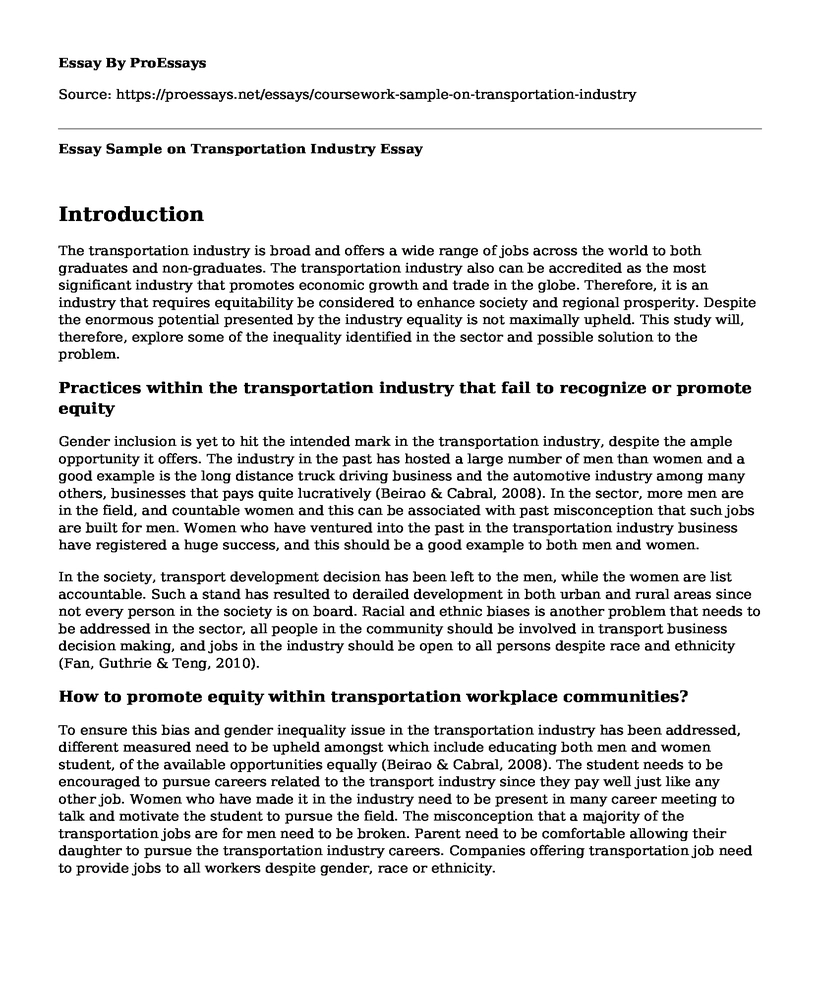Introduction
The transportation industry is broad and offers a wide range of jobs across the world to both graduates and non-graduates. The transportation industry also can be accredited as the most significant industry that promotes economic growth and trade in the globe. Therefore, it is an industry that requires equitability be considered to enhance society and regional prosperity. Despite the enormous potential presented by the industry equality is not maximally upheld. This study will, therefore, explore some of the inequality identified in the sector and possible solution to the problem.
Practices within the transportation industry that fail to recognize or promote equity
Gender inclusion is yet to hit the intended mark in the transportation industry, despite the ample opportunity it offers. The industry in the past has hosted a large number of men than women and a good example is the long distance truck driving business and the automotive industry among many others, businesses that pays quite lucratively (Beirao & Cabral, 2008). In the sector, more men are in the field, and countable women and this can be associated with past misconception that such jobs are built for men. Women who have ventured into the past in the transportation industry business have registered a huge success, and this should be a good example to both men and women.
In the society, transport development decision has been left to the men, while the women are list accountable. Such a stand has resulted to derailed development in both urban and rural areas since not every person in the society is on board. Racial and ethnic biases is another problem that needs to be addressed in the sector, all people in the community should be involved in transport business decision making, and jobs in the industry should be open to all persons despite race and ethnicity (Fan, Guthrie & Teng, 2010).
How to promote equity within transportation workplace communities?
To ensure this bias and gender inequality issue in the transportation industry has been addressed, different measured need to be upheld amongst which include educating both men and women student, of the available opportunities equally (Beirao & Cabral, 2008). The student needs to be encouraged to pursue careers related to the transport industry since they pay well just like any other job. Women who have made it in the industry need to be present in many career meeting to talk and motivate the student to pursue the field. The misconception that a majority of the transportation jobs are for men need to be broken. Parent need to be comfortable allowing their daughter to pursue the transportation industry careers. Companies offering transportation job need to provide jobs to all workers despite gender, race or ethnicity.
References
Fan, Y., Guthrie, A., & Teng, R. (2010). Impact of Twin Cities Transitways on Regional Labor Market Accessibility: A Transportation Equity Perspective.
Beirao, G., & Cabral, J. (2008). Market segmentation analysis using attitudes toward transportation: exploring the differences between men and women. Transportation Research Record: Journal of the Transportation Research Board, (2067), 56-64.
Cite this page
Essay Sample on Transportation Industry. (2021, Sep 02). Retrieved from https://proessays.net/essays/coursework-sample-on-transportation-industry
If you are the original author of this essay and no longer wish to have it published on the ProEssays website, please click below to request its removal:
- Animal Zoos Argumentative Essay Example
- Raising Awareness on the Importance of Online Civility - Essay Sample
- Essay Sample on Capitalization of Systems
- Essay on Mexico-American War: Cultural Adaptation, Political Discrimination, and Identity Formation
- Info Governance: Structured & Unstructured Data in the Workplace.
- Gender Inequality: Inequality Rooted in Gender Difference - Report Sample
- Essay Sample on People's Addiction to Their Phones







